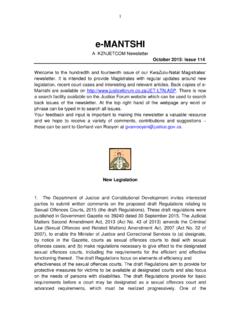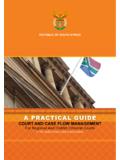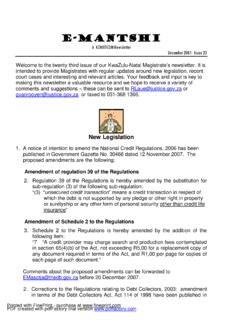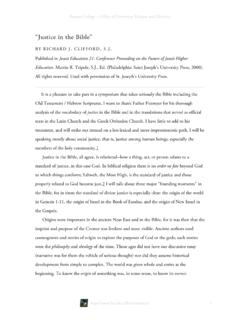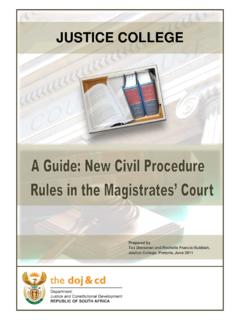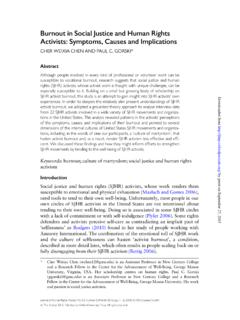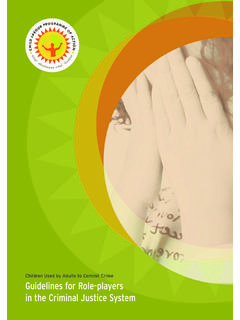Transcription of Department of Justice and Constitutional Development ...
1 Independent Projects TrustContact NumbersDepartment of Justice and Constitutional Development012 315 1111 Magistrates Commission012 325 3951 National Prosecuting Authority012 845 6000 Justice College012 481 2892 IPT031 265 0890 Design, Editing & PrintingCobalt - DurbanDean Griffiths082 452 5223for South African Lower CourtsPractical GuideCourt and Case Flow ManagementA Practical Guide forCourt and Case Flow Managementfor South African Lower CourtsCopyrightJustice College PretoriaISBN 0-620-34679-5 COURT AND CASE FLOW MANAGEMENTis a simple phrase adopted to propagate a collection of principlesand practices associated with constituting, supporting and managingboth the criminal courts and those cases which flow through principles and practices belong to everyone associatedwith criminal courts and cases, but more so to the judges,magistrates, prosecutors and administrative practitioners involvedat the heart of administering Justice through the GUIDEhas been compiled by magistrates in consultation with theDepartment of Justice & Constitutional Development and the NationalProsecuting Authority, as well as with representatives from all otherinstitutions involved with the criminal courtsThe guidelines seek to address issues pertinent to improving andmaintaining the effective and efficient operation of criminal courts,in the Lower Court jurisdiction in South Africa,in the interests of the proper administration of PageForeword : Judiciary1 Foreword : DOJ&CD3 Foreword.
2 Prosecuting Authority5 Introduction 7 Objectives 10 Operational Matters11 Case Scheduling 13 Awaiting Trial Prisoners 15 Monitoring Process18 Additional Considerations20 Presiding Officers 22 Prosecutors 24 Legal Representatives Police Services 27 Court Orderlies 29 Court Services 30 Language Services 32 Recording Operators 33 Correctional Services 34 Social Development 35 Dept of Health 36 Specimen Forms 37 JOE RAULINGACHAIRPERSONLCM SUB COMMITTEE ON CASE FLOW MANAGEMENTT hese Court and Case Flow Management Guidelines are meant toensure uniformity in the implementation of delay reduction mechanismsand case management methods within the Criminal Justice guidelines also establish a strong organisational foundation whichis supported by all role - players aimed at the achievement of earlydisposition in the great majority of line with the Constitution, which is the supreme law of the Republic,all role-players, through court and case flow management mustendeavour to strengthen respect for human dignity, the achievementof equality and the advancement of human rights and a case flows steadily and smoothly from filing to terminationand its life span is shortened, the community s trust and confidencein the criminal Justice system will be maximised and bolstered.
3 It ispleasing to indicate that we have all sworn ourselves to disciplineand milestone achievement was made during the visits throughout thecountry by the Lower Court Management sub-committee on CaseFlow Management, when role-players were encouraged to adopt anew mind-set and commit themselves to do more with less .We must accept that we live in a country with a scarcity of resourcesand we should therefore learn to double what is avaliable to carryout our mandate within the shortest given the agents of change, the courts are ready to take no chance inconvincing all the court users about our intention to deliver a serviceof excellence. The partnership that has been built over time betweenthe Lower Court Judiciary, the Court Services Branch of theDepartment of Justice and Constitutional Development and theProsecuting Authority bears testimony to the concept of Mutingati (Working Together). From the time the concept manifested itself allthree role-players put their shoulders-to-wheel in the fulfilment oftheir mandate and produced this magnificent document which outlinesthe guidelines on court and case-flow South Africans we have registered our country as one of thepioneers on delay reduction and case flow management within theCommonwealth of Nations and that this mission has been accomplished our focus should beon the elimination of external and self-generated causes.
4 While it isnot easy to control non-systematic delays, we are in position to tacklesystematic delays. This can be achieved if there is professionalismin court and case- flow behalf of the Lower Court Judiciary, I wish to extend our heartfeltgratitude to all those who participated in the production of theguidelines, in particular IPT who with funds from the AlanticPhilanthropies funded the publication of this RAULINGA2 MEME SEJOSENGWECHIEF DIRECTOR : COURT SERVICESDEPARTMENT OF Justice & Constitutional DEVELOPMENTThe core mandate of the branch - Court Services - is to provideeffective and responsive management and administrative supportfor judicial decision-making processes within the court strong co-operative working relationship between the Judiciaryand the Department of Justice and Constitutional Development (DOJCD) in their complementary roles is fundamental to the deliveryof court services to the court system, especially the criminal Justice system, is undertremendous pressure to show service delivery and the need for urgentand serious intervention in this regard cannot be over conceptualization of Case Flow Management has resulted in thedevelopment of these Guidelines, made possible through the jointefforts of Court Services, Lower Court Judiciary and the ProsecutingAuthority.
5 The exceptional leadership of the Chairperson of the LowerCourt Judiciary sub-committee on Case Flow Management, Mr. Raulinga, was eminent in the drafting process. A sincere word ofthanks is extended to all the officials within the criminal Justice valuechain who participated in workshops that were held throughout thecountry, as part of the guidelines Development process by the LowerCourt Management Committee guidelines are an outstanding example of a partnershipapproach to the implementation of a service delivery improvementinitiative within the criminal Justice environment. The Department hasalso developed a computer system - the e-Scheduler - to assistcourts in their daily Case Flow Management operations and to ensurethat a performance management culture is established and happensat a local level. The system has been implemented at 44 courts andonce the system has stabilised it will be rolled out nationally, Case Flow Management in the Lower Courts could beconceptualized as follows:3 Phase 1To establish an environment within the court that is conducive toimplement and operate Case Flow Management namely, an IntegratedCase Flow Management Centre which ensures that Judicial Leadershipis prominent by, inter alia: getting all role players within the criminaljustice value chain on board; ensuring that governance structurescontinue to oversee the management of the concept and an IntegratedCase Flow Management Centre is managed by a registrar under theCourt Manager.
6 The new dispensation will provide the lower courtswith legally qualified registrars with case flow managementresponsibilities in support of the judiciary in ensuring effectiveprocessing of cases; the reception/channelization court concept isoperational; the most appropriate procedures to operate the CaseFlow Management Centre have collectively been developed by theusers and stakeholders and a local case flow management plan iscollectively developed and 2To enhance Case Flow Management at court level through theutilization of information technology - the implementation of thee-scheduler system as a tool to manage criminal 3To enhance Case Flow Management at the court level throughestablishing Case Flow Performance 4To enhance Case Flow Management at the court by linking any otherinitiatives relating to improving case flow to the Integrated Case FlowManagement Centres for monitoring and management purposessuch as video remands, trust that these guidelines will assist all the role players in taking CaseFlow Management forward and will be a living document which willbe enhanced and updated from time to time cover other SEJOSENGWE4 VUSI PIKOLI.
7 NATIONAL DIRECTOR OF PUBLIC PROSECUTIONSS ince its inception, the National Prosecuting Authority has focusedmuch of its attention on core functions associated with administrationof the criminal courts. A separate business unit within the organisation- the National Prosecution Service - has been largely responsible forguiding prosecutors throughout South Africa in its attempts to improvethe service of these courts through improved quality of prosecutionsand better utilization of court time and are indeed proud of the manner in which prosecutors haveresponded to this call over the past five years and have seen theresults of this response in all areas of the administration of justicein the country. Many of our partners have also responded to thisneed and we recognize and commend them for their any business environment, there is always a need to examine themechanics of operations - and the need is no less in the criminalcourt system in which we operate.
8 In circumstances where the courtscarry a very heavy workload, it remains essential to review mattersconstantly and to take any step forward to improve our service. I ammost encouraged that members of the Judiciary, National ProsecutionService and Department of Justice and Constitutional Developmenthave engaged eachother in this context and have come up with thisdocument which is a combined effort to improve and strengthen thework of our criminal need for all stakeholders to work closely together cannot beemphasized more than it should be right now. The country s criminalcourts are under overwhelming pressure to deliver. This cannot beachieved effectively without a response to the need for a completelysatisfactory degree of co-operation amongst the role players. I see thisdocument as an all important step in that direction - a guide to improvethe focus of all towards more effective and efficient administration ofjustice through the courts, and a better understanding and appreciationof what is expected from each of the role players congratulations go to the multi-sectoral team who initiated andcompleted this task.
9 Clearly, the interests of proper and effectiveadministration of Justice were at the fore. It is therefore my sincerehope that all the role players involved in the courts - magistrates,prosecutors, clerks, police and others - fully support this initiativeand work in unison towards achieving these PIKOLI6 INTRODUCTIONThe need for better case flow management arises from the rapidpace at which the workload of criminal courts in South Africa hasincreased over the past few decades. So much so that it is commonto refer to case backlogs in most courts and a managementstyle has developed which is more adapted to dealing withadjournments than trials. In such circumstances one cannot expectthe public to be satisfied that criminal courts meet their expectationsor that the expectations set out in the Constitution are collated over the recent past show that only 30% of court timeis actually available for trial matters, whilst the balance is spent onadjournments and the like.
10 Better utilisation of court time throughproper court and case flow management should reverse this will be noted, the material in the guide is nothing new - it is infact a compendium of existing requirements and procedures whichare perhaps not effectively practiced on a uniform basis. Thecontents will thus serve as an easy reference to facilitate a universalcase flow management practice in District and Regional will also serve to emphasize the management of court sessionswithin the hands of judicial officers and clarify the roleand involvement of all other participants in court and caseflow police are responsible for the investigation of cases and thedelivery of evidence, it is prosecutors who decide which cases totake to court and which jurisdictional forum to present them enrolled, the presiding magistrate assumes control of everyaspect of the movement of the case through the court processes,in the interest of the proper administration of the forum in which this takes place, the court itself is thedomain of the presiding magistrate who is accountable andresponsible for the control of all persons and proceedings therein,in accordance with prevailing rules and laws.
